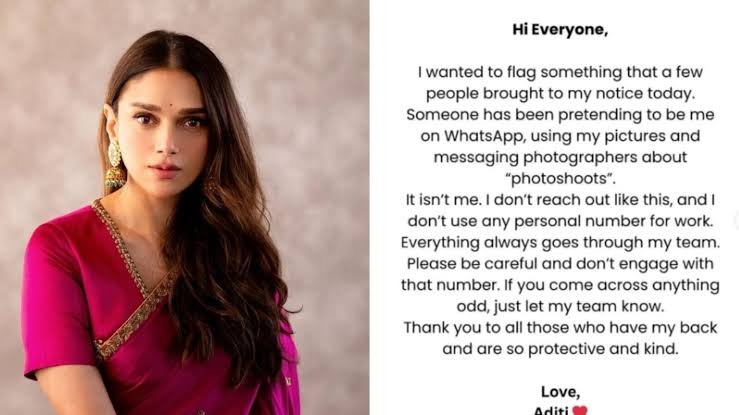Aditi Rao Hydari’s warning over a WhatsApp impersonation attempt has rippled through film and photography circles, exposing how celebrity identity theft—once limited to rogue social-media accounts—now unfolds through more intimate and targeted digital channels. Her response, and the anxious messages that followed from industry professionals, reveal a widening vulnerability: the ease with which scammers can appropriate fame to exploit professional trust.
A Sudden Alert From a Familiar Name
Late on Sunday, actor Aditi Rao Hydari opened her Instagram page not to promote a project but to sound a public alarm. According to her account, an unidentified person had been contacting photographers and industry professionals on WhatsApp using her pictures, her name, and a number falsely labelled “aditi rao hydari.”
The messages, she said, were framed around “photoshoots,” a routine professional interaction in an industry where such requests often arrive at short notice. But they were entirely fabricated.
“Someone has been pretending to be me on WhatsApp… It isn’t me. I don’t reach out like this, and I don’t use any personal number for work. Everything always goes through my team,” she wrote.
Her post quickly circulated among cinematographers, stylists, and junior crew—people for whom a message from a well-known actor can be both a career opportunity and a point of vulnerability.
Inside the Impersonation Attempt
Hydari’s account suggests the impersonator relied on highly recognizable cues:
her publicity photographs, her professional name, and an outreach style that could plausibly pass as legitimate. Several recipients reportedly alerted her team after sensing inconsistencies—an unusual tone, an unfamiliar number, or the absence of formal scheduling channels.
The impersonator’s motives remain unclear, but digital-fraud researchers note that such schemes often escalate to requests for advance payments, confidential images, or personal data. The rising use of WhatsApp for professional coordination—favored for its speed and convenience—has created openings for impostors who understand the industry’s informal rhythms.
Hydari urged followers to “be careful and don’t engage with that number,” emphasizing that any suspicious contact should be reported to her team.
A Pattern in the Entertainment Industry
While impersonation of public figures is not new, the method has sharpened. What once happened on fake social-media profiles has now moved to closed messaging platforms, where verification is more difficult and recipients may feel more pressure to respond quickly.
Photographers, especially freelancers and early-career artists, are frequent targets. A request from a prominent actor can influence bookings, travel, and unpaid preparatory work. That pressure, experts say, makes them susceptible to manipulation by someone who appears to speak with authority.
Hydari’s warning aligns with a broader global trend: actors, musicians, and influencers increasingly issue public notices urging colleagues not to trust unsolicited digital outreach—even when accompanied by familiar images.


